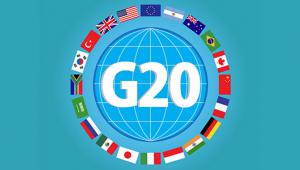Maurice Obstfeld, director of the IMF’s research department, warned that emerging and developing economies especially “could be in for a bumpy ride this year” as the world’s modest growth looks set to reduce further.
“Fundamental forces underlying our World Economic Outlook in October have not dissipated and in some respects have intensified,” he said at the launch of the fund’s January economic outlook earlier today.
Three central shifts affecting the global economy – slow growth in China, tumbling commodity prices and asynchronous trends in monetary policy – have all been stronger than anticipated three months ago.
As a result, the IMF anticipates global growth to rise moderately, from 3.1% in 2015 to 3.4% this year and to 3.6% next year – a 0.2% reduction on the fund’s projections for 2016 and 2017.
Growth in emerging and developing economies, while still accounting for over 70% of global growth, has declined for the fifth consecutive year, while advanced economies continue a humble recovery.
Spillover effects from China’s economy have played a significant part in this, as growth there slows amidst a rebalancing of the country’s economy away from industry and construction and towards services and consumption.
While the IMF said growth in China is evolving broadly as envisaged, the slowdown in imports and exports has been faster than expected, investment and manufacturing activity have been weaker and markets have been losing confidence around the future performance of the Chinese economy.
Other economies are feeling the effects of this through trade channels, weaker commodity prices, diminishing confidence and increasing volatility in financial markets, in particular in parts of Asia.
Other emerging and developing economies are facing “especially severe and multiple challenges”, Obstfeld said, notably Brazil and Russia, who endured strongly negative growth last year. The IMF expects the sharp contractions in their economies in 2015 to decelerate over the coming two-year period.
A sharp fall in commodity prices – most notably oil, which has plunged more than 40% since October – is also a key element in the IMF’s downward revision and the lower performance of many national economies.
The IMF said this poses clear fiscal challenges for countries whose economies rely on exporting commodities. Budgets will have to be readjusted to a more sustainable basis, Obstfeld said, adding this might present an opportunity for tax reform.
In advanced economies, the downgrading of growth largely relates to the US Federal Reserve’s move to increase interest rates in December, following which outlooks for the US have become less optimistic. Growth prospects for the EU, eurozone and Japan however remain broadly unchanged.
Obstfeld said a number of downside risks continue to threaten the outlook, one being the possibility of China – the world’s second largest economy – encountering rough patches further down the road, and this spilling over elsewhere.
The movement of refugees from Syria and Iraq has had a prominent affect, Obstfeld added, placing extreme burdens on neighbouring countries and spilling over into Europe, sparking political discord and threatening the current framework of free labour mobility.
He said that while rapid absorption of refugees into the labour market will ultimately lift output, it will also place upfront demands on national budgets.
In the face of these risks, “action is needed”, Obstfeld said. He recommended countries look to support demand, make structural reforms to support economic efficiency and long-term potential and to further strengthen and widen the international safety net, bolstering resilience for whatever may lie ahead.













